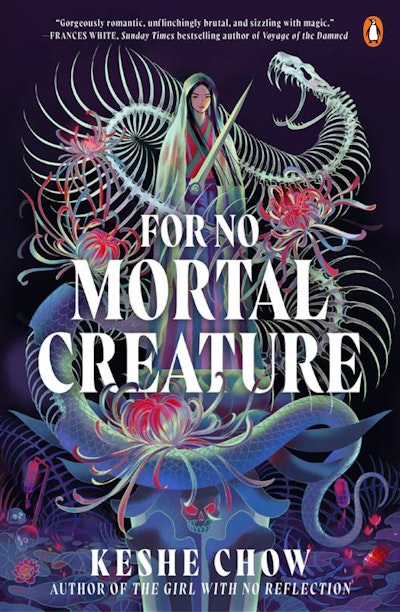In the low light of the falling dusk, I found myself thus: half bent over, hands full of Shadowside, the point of a longsword against my neck.
A voice spoke from behind me. “Rise, trespasser,” it said, “and drop your loot.”For a frozen, empty moment, I stayed still, weighing my chance of escape. Everything around me— every sensation—distilled into sharp focus. The forest, silent with the promise of unfallen snow. Dewdrops that sparkled on dried leaves beneath my feet. My heartbeat pounding in my ears.Could I make a run for it? I was alone, and a good way off the open road, meaning I could potentially lose a pursuer in the dark, dense forest. But making even a single movement might prompt my attacker to drive in their blade. And foolishly, I was unarmed, having stowed my dagger in my boot. No. There was no way to escape this mess.Inwardly, I cursed my poor decision-making and begrudgingly dropped the herbs. As soon as they hit the forest floor, the delicate purple flowers began to wilt, disintegrating into the smattering of frost atop the soil. It was shuāngjiàng, late October, season of the Frost’s Descent, and even this far south the ground was laced with ice.I clenched both fists, nails digging into palms, and willed myself not to scream. Seeing the flowers dying was like a knife twist to the gut. I’d spent days traveling here on foot, with nothing more than a dagger and my wits, making camps up trees to keep safe overnight. And just before I was accosted, I’d spent upward of half an hour sawing through the woody stems with an increasingly blunt blade, cursing as my hands stung, cramped, and blistered. There was a narrow time window to gather Shadowside, and that was now—at the confluence of day and night. At this precise moment, its effects were most potent. Any delays in harvesting it meant the power would wane, rendering it useless, and damnit I needed those herbs.Without them, my grandmother would die. My heart hammering, I rose slowly, raising my hands to show I was weaponless. Well, my hands were, at least. I didn’t volunteer any information about what was in my boot.“Turn around,” the voice said, gruff.“Remove your blade, then, so I may do so without slicing my neck.” I managed to keep my voice even. Internally, though, I wanted to scream. While I wasn’t technically doing anything wrong by hunting—or gathering plants— this interruption was wasting valuable time.The sword’s pressure relented, just slightly, and I spun to face my attacker.Typical, I thought, suppressing the urge to roll my eyes. A Lancaster soldier. They were always crawling around the forest like cockroaches: ugly, armored, and almost impossible to kill. Like most of them, this one was pale, his shadowed eyes gray in the crepuscular light. If it was daytime, they would probably be blue. His helmet hid the color of his hair, but not the thin rivulets of sweat coursing down his face. Clad in iron, he bore the Lancaster sigil—a blue-and-white shield with the silhouette of a tree— upon his chest. Compared to the thin cotton of the hànfú I was wearing, and my feigned indifference, he looked positively overdressed. “To what do I owe this honor, My Lord?” I said, masking the subtle sneer in my voice. I’d used the Trader’s Tongue, the mashed-up dialect that had evolved along the towns and ports that lined the Stone Road, the primary route for trade. With its innumerable clashing cultures, the road’s dialect obscured some of the more expository accents of each region, though my black hair, brown eyes, high cheekbones, and pearlescent skin would no doubt mark me as being from west of the border. “Declare yourself, woman,” he demanded, his voice cracking on the last word.








